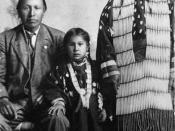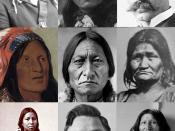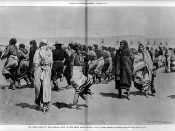The new Americans who settled the "new world" took control of their own destiny and prevented conquest by British, French, Spanish, or other world empires.
Then, at the same time, these same people took the destiny of Native Americans into their own hands also. These Native Americans were cheated out of their lands and sneakily "rubbed out" by force, religion, and money. They were put on reservations to live out the rest of their lives as dependant captives of a government that cheated and lied to them. Forced onto these reservations by treaties, Native Americans had to stand by and watch helplessly as their culture and people were overcome by a new "white" way of life (sunnetworks.net).
From the very beginning the government of the United States of America had developed a special relationship with Indian tribes. Treaties with Indians were first made under the category of "independent nations" and then later with "domestic dependent nations."
Then, in 1871 Congress quit making official treaties with the Indians, but still continued to govern Indian activities. Through the use of soldiers, missionaries, traders, and teachers the United States government attempted to civilize these so called savages while at the same time expand government territory. Early attempts by the government to tame and civilize the Indians were made by introducing Christianity. For example, in the late eighteenth century a deal was made that gave property rights of a large chunk of land out west to a society of Moravian Brethren with the very intention of civilizing the Indians through Christianity. But of the thousands of Indians who inhabited the land originally, only twenty or so remained after the Brethren arrived. Thirty years later the Brethren admitted defeat in their attempt and gave the land back to the government (sunnetworks.net).
Now we must be...


